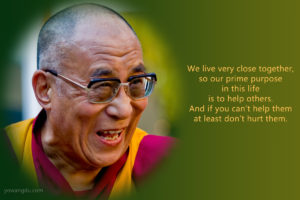Compassionate Leadership – what is it?
Compassionate leadership expresses, in words, feelings and actions, a concern for others and a desire for their well-being. Compassion opens and softens your heart. It nurtures, and brings out the best in others, who are, in turn, more likely to be patient, forgiving, and compassionate with you. They are also more likely to pay it forward.
Compassion begets compassion.
Compassion is based in the felt-sense of knowing everything in the uni-verse is part of something larger. We feel connected. Connection leads us to care about others. When we disconnect from and make others separate, not like us, less human, we are able to do harm. It negates our capacity for empathy. Terrorists, and those who intentionally cause others to suffer, embody this principle.
Does being a compassionate leader in business mean being soft on the competition, losing the “killer instinct”, accepting poor performance? Absolutely not.
You can be compassionate towards others while competing to defeat them – think martial arts. You can be compassionate while defending yourself against harm, by doing so with an intention to inflict the least pain and suffering possible. In some cases, you can prevent others from doing harm, and bring out the best in them, by being compassionate. Consider Father Greg Boyle’s compassionate leadership of gang members. who are, in turn, becoming compassionate, caring, productive members of society.
Compassionate Leadership is a Movement
Albeit not a formally organized or structured one. It’s been brewing in the U.S. since at least the 1960s, when a number of spiritual seekers studied Buddhism and meditation.
- Daniel Goleman, author of Emotional Intelligence
- Sharon Salzberg, meditation teacher and founder, Insight Meditation Society
- Mirabai Bush, who helped develop and popularize Google’s mindfulness program – Search Inside Yourself
- Richard J. Davis, PhD, founder, The Center for Healthy Minds, University of Wisconsin
- Jon Kabat Zinn, Professor of Medicine Emeritus, creator of the Stress Reduction Clinic and Center for Mindfulness in Medicine
These early adopters integrated meditation, including mindful and compassionate practices, into their professional and personal lives. They became teachers. Students dribbled in. Word spread, slowly, mindfully. The students grew in numbers. Meditation retreats developed waiting lists. Eventually the tipping point happened. Meditation is now a thing.
Compassionate Leadership – who’s practicing it?
The list of notables practicing meditation, who will, if they haven’t already, bump into compassionate practices include:
- CNN news anchor, Anderson Cooper
- Congressman Tim Ryan
- Former Medtronics CEO Bill George, professor of management practices at Harvard
- Arianna Huffington
- Oprah Winfrey
- It’s on the agenda at Davos, World Economic Forum where 9 global executives fessed up to trying or practicing meditation
- Google, Apple and Target have integrated meditation into the work place
Cisco and Corning CEOs are reading books about the power of compassion. Google’s mindfulness program, Search Inside Yourself, evolved into a non-profit organization. Founder, Chade-Meng Tan, claims mindfulness meditation, of which loving-kindness/compassion is a subset, creates a path to personal success and world peace.
Compassionate Leadership – why you should consider It
In a recent interview with Lady Gaga, the Dalai Lama, who embodies compassion, responded to a question about how we should approach bad stuff, including acts of terrorism and violence around the world.

“Once [a] tragic situation happens, not avoid — [but] look at more deeply, widely. Many positive, happy things are there if you look [from a] wider perspective. If you look real closely, it appears unbearable. But if you look widely, [you see] other positive things there.”
While reading that statement, I received this note from my colleague Tanya Odom, diversity consultant, social justice worker, coach, and more.
There are some really good things happening with companies looking to talk about race… in a way that I have never seen…work that was already scheduled/planned…has taken a different turn in light of all that is happening. [References to Dallas, Nice, Baton Rouge]
Here’s what Tanya is seeing. As acts of terror flash across our news screens, there is a less publicized increase in acts of compassion. It’s the physics of human dynamics. We seek to balance our world in favor of kindness, so an increase in violence is met with an increase in compassion. And if compassion can help us address violence, gangs, and racism, maybe, just maybe, it can help you address human problems in business. As a not insignificant side benefit, you’ll also be happier.
If you’d like to continue the conversation about being a compassionate leader, give a quiet shout here.

